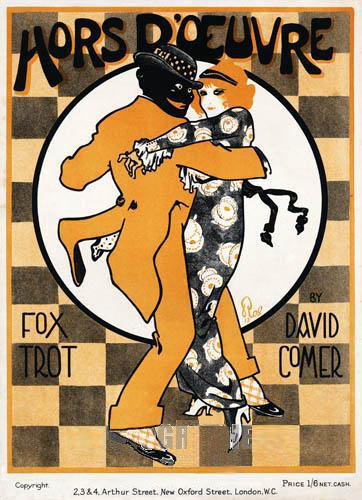
. . The Lotus Club was in Knightsbridge,
one of that spreading number of all-night establishments catering for
a generation of pleasure-seekers to whom time meant very little now that
the ever-present motor car could whirl them from one end of the metropolis
to the other in a matter of minutes, and who were in the grip of the latest
dancing craze which, perhaps more than anything else, had wrought the
great change in manners and style and spirit which Mr Franklin had pondered
on earlier that evening. The genteel ballroom exercises of waltz and polka
had been invaded from across the Atlantic by the more intricate and intimate
patterns of the Boston, the one and two steps, and that extraordinary
fusion of the classical and the abandoned, improvised originally by dockers
on the Buenos Aires waterfront, and now such a passion with the smart
set that it had become a national joke - the tango.
.
. Mr Franklin knew them, and had been able to hold his own on those
occasions when he had accompanied Peggy to dances and parties, but like
everyone else in Europe who was not stone-deaf he was aware that even
these new rages were becoming old hat, not just with the ordinary public
but also at the exclusive dances which were something of a mania with
fashionable hostesses that year, from four to six-thirty every evening,
and which were threatening to sweep away for ever that sacred ritual of
polite society, afternoon tea. Even the latest sensation, the fox-trot,
was positively sedate beside some of the ragtime rhythms which had come
blaring out of the West, to be instantly amplified by every gramophone
and dance orchestra in the land, and convince the older generation that
Babylon and Sodom were come again. The spectacle of young men and women
(some of the latter quite obviously unencumbered by corsets) quivering
and gyrating wildly to the insistent beat of Negro music, with its suggestion
of the bordello and the jungle, with a scandalous symptom of the new decadence
- but what could one expect of a society in which even Bishops could be
seen smoking in public?
.
.
.
. They went back
upstairs and watched
a girl in Red Indian costume and headdress singing, "The Pipes of
Pan", a comedian who, curiously enough, seemed to have laundered
his material for the supper-club audience, and when the cabaret was finished,
danced some of the less strenuous numbers. But Mr Franklin could sense
that Pip was missing joining in the more energetic jazz dances; she sat
with parted lips and tapping feet as the couples threw themselves about,
and he was not surprised when, towards the finish of a one-step, she guided
him through the dancers to the platform, and slipped away for a whispered
word with the black pianist. He listened, teeth gleaming in a great grin,
and when the dance finished he struck a dramatic chord, clapped his hands
to the orchestra with a chant of "And-a-one-two-three-four!"
yelled "Hit it, honey!" to Pip, and swung into a crashing ragtime
number.
.
. Pip, from the platform, winked at Mr Franklin while the dancers
began to stamp, clapped her hands, swayed in time to the music, and in
a voice astonishingly strong and clear for her small body, gave tongue:
.
. Around Mr Franklin the dancers were clapping and chanting with
her, the room began to swing to the heady, insistent beat, the Negro pianist
pounded ecstatically, standing up and bouncing as he hit the keys, Pip
threw back her head and punched her fists in the air to emphasize the
words:
.
. Mr Franklin gingerly edged his way to the side of the crowded
floor, out of the shuffling, stamping, chanting throng, but keeping his
eye on Pip's impromptu performance. He was no authority on ragtime, or
even on stage presentation, but he did not have to be to see how skilled
she was, how practised her style, how complete her control of her audience.
Hips swinging, shoulders shrugging, she swayed along the front of the
stage, coaxing the dancers to even greater exertions, then retreated,
laughing and clapping, beckoning them to follow, then teasing them by
dropping her voice to a throaty whisper:
and finally strutting forward again to finish on a magnificent, full-throated
flourish, arms flung high above her head:

